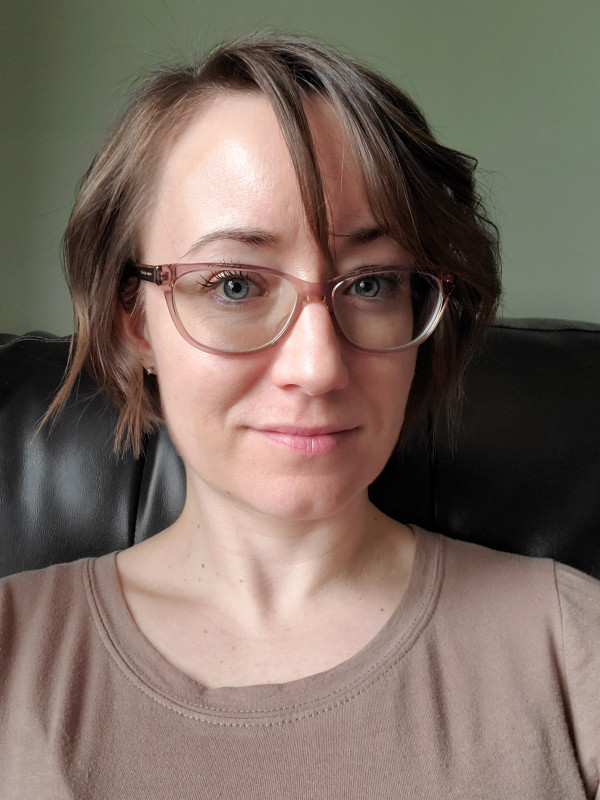Becoming a Change Maker: Meet Megan Shapka
 Growing up on a farm northwest of Calgary, Megan Shapka says her passion for sustainability and ecological thinking came naturally due to her deep connection with people, animals and the land. Now living in Lethbridge, Alberta, Megan puts that passion to work as the Associate Dean in the Centre for Applied Research, Innovation and Entrepreneurship at Lethbridge College.
Growing up on a farm northwest of Calgary, Megan Shapka says her passion for sustainability and ecological thinking came naturally due to her deep connection with people, animals and the land. Now living in Lethbridge, Alberta, Megan puts that passion to work as the Associate Dean in the Centre for Applied Research, Innovation and Entrepreneurship at Lethbridge College.
In 2019, Megan found herself browsing Master’s programs that would match her interests. That’s when she found Cape Breton University’s Master of Education in Sustainability, Creativity and Innovation (MEd SCI). “I knew immediately it was the degree I had been searching for,” says Megan. “It had the perfect blend of courses that would address my desire to learn more about transformative education, sustainability, innovation and creativity.”
When Megan applied for the program, she was running an innovation and entrepreneurship extracurricular program and says the curriculum of the MEd SCI program aligned perfectly with the concepts she had been sharing with students. She says not only were the topics interesting and applicable to her career, but that the professors were encouraging and allowed the customization of assignments to fit Megan’s work environment.
“I often read all of the optional readings on top of my assigned coursework because everything was so fascinating,” says Megan. “I loved learning about new concepts such as Living Schools and Campuses and Sustainable Happiness. There was a great mix of foundational concepts in education and innovative teaching methods.”
This May, Megan graduated after completing her thesis, which she says was the most challenging and most rewarding experience within the program. “I appreciated the ability to select a research topic that resonated with me both personally and professionally while also allowing me to apply the concepts I had studied throughout the program,” she explains. “In fact, I’m very excited to be using my research findings to inspire transformational change not only at my own college, but across the college system.”
Megan says an added bonus to the MEd SCI program is the opportunity to interact with classmates from around the world while learning from interesting professors and guest speakers. “I made incredible, ongoing connections and thanks to the online collaboration tools we were able to work together to create some really interesting assignment submissions,” she says. Megan adds that while many of her classmates were in the K-12 education system, a few others also worked in post-secondary settings. “It was so interesting to learn from everyone, and the coursework can easily be applied to any educational environment,” she notes.
Despite working full time while pursuing her degree, Megan says the workload within the program was reasonable, especially because she was able to customize her assignments to align with her work. “My employer appreciated the innovative ideas I was bringing to our office and campus thanks to the courses I was taking,” she explains. “Having completed the program, I believe even more strongly now that everyone can be a change-maker.”
Megan says one of the most important takeaways of the program is understanding that students are deeply passionate about sustainable development and educators should be fostering those interests and encouraging action. “The world is a different place in the 21st century and will continue to evolve,” she explains. “Today’s youth face more complexity than previous generations and must learn to utilize tools and skills to sort through this complexity and learn from it.” With the right skills and knowledge, educators can empower future generations to develop an ecological mindset with an appreciation for the interconnectivity of all living things.
Moving forward, Megan is excited to continue to expand her understanding of holistic well-being for all and the importance of ecological thinking. “I now appreciate the role of Nature as a teacher more than I did in the past and look for ways to practice systems thinking in all aspects of my work,” she says. “The traditional educational system is out of sync with sustainable development and I believe the concepts covered in the MEd SCI program align perfectly with the mindset educators should be building.”
To those considering taking the program, Megan says anyone looking to embed sustainability and holistic well-being into their professional practice will find their place in CBU’s MEd SCI program.